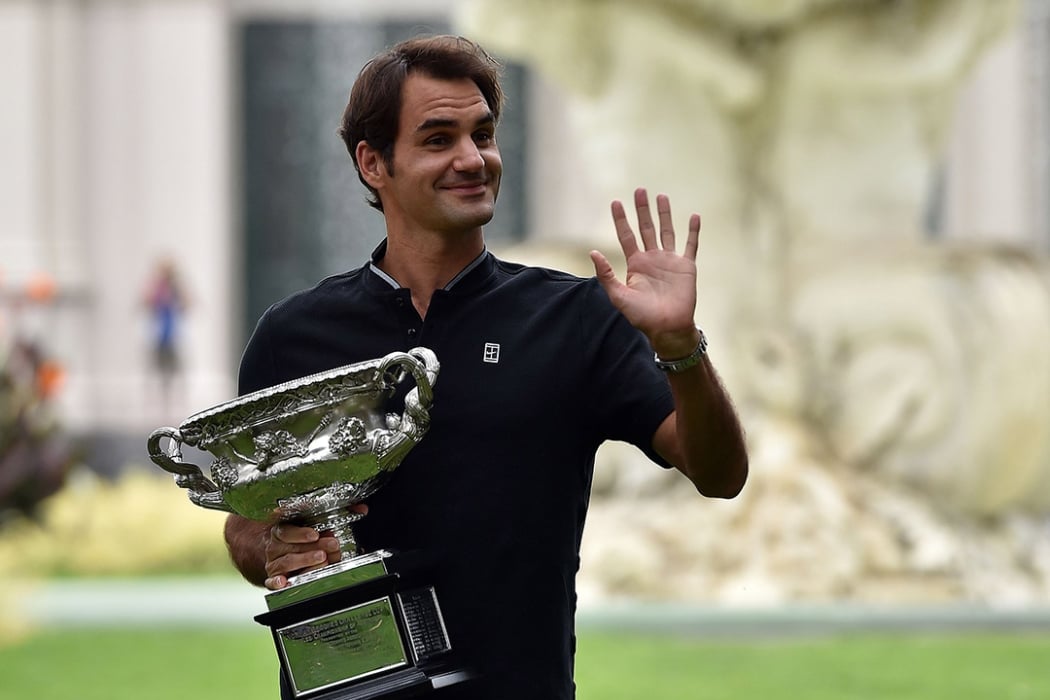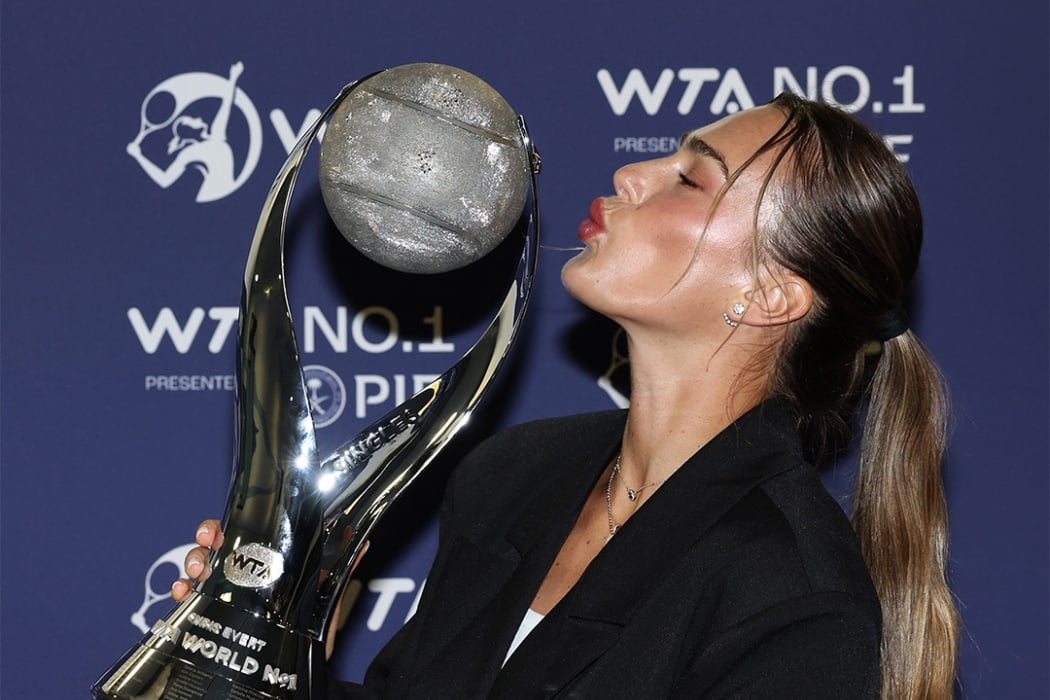When Aryna Sabalenka reached championship point at Australian Open 2023, she was on the brink of her first Grand Slam title.
She then double-faulted.
A knowing murmur went up through the stands at Rod Laver Arena, as if the crowd was wondering: were Sabalenka’s serving yips about to return, at the worst moment?
Sabalenka had certainly not forgotten what unfolded 12 months earlier in the same country.
In January 2022 she was in Adelaide for two tournaments at The Drive. She’d arrived following a career-best season, highlighted by major semifinals at Wimbledon and the US Open – her first appearances in a Grand Slam second week – and ending 2021 at world No.2.
Yet suddenly, she completely lost control of her serve.
In her opening match at Adelaide 1, against world No.100 Kaja Juvan, she sprayed 18 double faults in a straight-sets loss. There were more in her first match at Adelaide 2; against 93rd-ranked qualifier Rebecca Peterson, she succumbed in three sets after recording 21 double faults.
Slay the double faults away 💪 @SabalenkaA pic.twitter.com/5iF9tElUMX
— #AusOpen (@AustralianOpen) December 10, 2024
During the Peterson match Sabalenka wept on court and at times resorted to under-arm serving. Former doubles world No.1 Storm Hunter remembers watching it unfold on TV from the players’ lounge.
“Everyone knows the serve is her strength, or should be her strength. And it was actually really hard watching that,” Hunter told ausopen.com. “A lot of us were, to be honest, feeling sorry for her, because no-one wants to be in that position.”
Survival
A few days later, Hunter – then known by her maiden name Sanders – drew Sabalenka in the first round of Australian Open 2022. She ignored the speculation surrounding the state of Sabalenka’s serve and confidence as the match loomed.
“I don't care whether she has yips or not – she's No.2 in the world,” Hunter said.
“There was never a conversation in my team of like 'oh, once she starts double faulting, you're gonna get this.' It was almost probably unprofessional or immature to think 'oh she's just going to keep serving like that'. Because she's a superstar; we respected her, her game, and her serve. We couldn’t take that for granted.”
PRICELESS MOMENTS: Win great prizes with Mastercard
Under lights at Rod Laver Arena, Hunter broke Sabalenka in the opening game, helped by two double faults. She won the first set, and forged ahead 3-1 in the second – but never felt convinced she was in control.
"She didn't give anything away mentally,” Hunter said. “I looked down the other end, and it seemed she was as composed as she could be. She wasn't breaking down like she was in Adelaide.
“I just felt like, she's gonna find a way, she's a competitor.”
Sabalenka rebounded to win 5-7 6-3 6-2, finishing the match with a comparatively low 12 double faults. Her post-match assessment? “I just stopped thinking and I just start playing. My goal was just to put as much balls as I can back.”

Sabalenka also recovered from a set down in the second round, and again in the third round to beat Marketa Vondrousova, joking on court: “Mostly I'm happy that I made only 10 double faults.” Her scratchy run ended in the fourth round against Kaia Kanepi – but not before a final-set tiebreak.
It was extraordinary Sabalenka had managed to get that close to a major quarterfinal with a serve so unreliable. As well as her inspiring fighting qualities and resilience, the fact she found some humour amid the crisis further endeared her to fans.
But she had a significant problem to confront – and she set about solving it.
Revival
Sabalenka engaged biomechanist Gavin Macmillan in mid-2022, a person she continues to work with today.
“She had so many things wrong from the beginning, with her toss arm, what she was doing with her right arm,” McMillan explained during an interview with Performance-Plus Tennis.
They worked on making her take-back more fluid and her weight-shift more in sync with her arms, and set her wrist at the more correct, neutral angle – all contributing to a lower, better-controlled ball toss.
She began to flourish again on court. By the US Open Sabalenka found herself back in a major semifinal, and ended the season as WTA Finals runner-up.
Sabalenka chose to begin her 2023 season in Adelaide. A return to that venue could have re-opened old wounds; instead it proved cathartic. She charged to the title without losing a set, positioning herself as one of the biggest title threats at the Australian Open.
She credited her serve for helping her Adelaide International triumph. "I played her in doubles [that week] in Adelaide, and I noticed a big difference in her serve,” Hunter confirmed.

“She was just so calm and confident, and it was heavy; I felt like this was the biggest serve on tour, at that time, whereas I didn't feel that when I played her in singles a year before.
“She was going for it, and just had the belief in it, and almost had turned it from a liability into a strength. Which is really hard to do in tennis – credit to her and her team for being able to make that change.
“I was like, ‘it's a huge weapon now; she's gonna earn a lot of free points from it’.”
Triumphant
Behind that fearsome serve Sabalenka stormed into her first major final at Melbourne Park with six straight-sets wins. To that point in 2023, her win-loss record was 10-0 and she was a perfect 20-0 in sets.
Then came the final against Elena Rybakina – one of the great Grand Slam deciders.
Slamming an ace to arrive at that first championship point, Sabalenka banished the subsequent double fault from her mind to create a second opportunity, then a third, saving a break point in between. “How is Sabalenka handling these points?” former top-10 player Chanda Rubin wondered aloud in the commentary booth. “Mind has gotta be racing.”
On her fourth championship point, Sabalenka prevailed 4-6 6-3 6-4.
She rose to debut at world No.1 later that season and returned to the Australian Open in 2024 and successfully defended her title, overwhelming Zheng Qinwen in the final.
That performance saw her land 67 per cent of her first serves, and she never once double-faulted.
“For her to serve [those numbers] in a Grand Slam final, from where she was, is really a testament to the guts it took for her to face it, and do the things on a day-to-day basis to try to change it,” Macmillan said.
“This last off-season [working with her] was one of the better experiences I’ve had in my career in any sport.”

